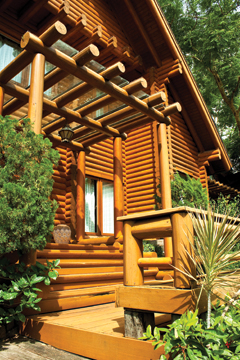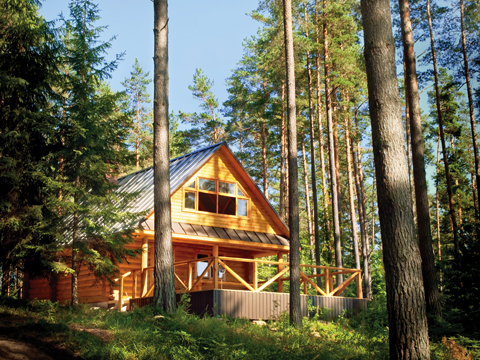For Jim McKinney of Chicago, building the log home of his dreams was an exciting, but substantial, venture. When he began planning the Jackson, Wyoming, home more than five years ago, McKinney did meticulous research to make sure he selected a reputable log home producer who would understand the look and feel he wanted to create in the home. Ultimately, he wanted to work with a company that could design a home that would be “100 percent me.”
“You can expect that a log home is going to be a little more expensive [than a conventional house]—but you get what you pay for,” says McKinney, who worked with PrecisionCraft Log & Timber Homes of Meridian, Idaho. “If you want something made especially for you, you’ll pay a little extra for it.”
Like McKinney, most prospective log home owners want assurance that the company they select is reputable, with credentials that demonstrate a history of turning out a product that satisfies customers and stands the test of time. That’s why prospective homeowners should do their homework, searching out log home producers who are fully credentialed, experienced, and financially secure. Here are a few steps to help you get started.
Explore Your Options
A wide variety of resources are available to help prospective log homeowners identify and evaluate potential log home companies. Start with a search on www.logcabins.com to find out what choices are available for everything from log style and size to services provided by the company. Once you’ve identified several log producers that interest you, request their catalogs and talk to sales representatives. Contact the Better Business Bureau to find out if any complaints have been filed against the company, and find out if they are members of their local Chamber of Commerce. Ultimately, you want to find a company with extensive experience and a reputation for customer satisfaction.
“In today’s market, longevity is key,” says Dave Carter, president of Appalachian Log Homes Inc., in Knoxville, Tennessee.
Affiliations Are Important
Professionalism and experience are crucial, so membership in trade groups is a good indication of a company’s dedication to quality and service.
“A commitment to professional growth, service, and community can tell you a lot about a company and its leadership,” says Jan Koepsell, founder and co-owner of Expedition Log Homes, LLC, in Oostburg, Wisconsin, and chair of the Log Homes Council.
The Log Homes Council, an arm of the National Association of Home Builders, is the most recognized national association representing the log homes industry. However, there are many excellent log home companies that are not members. The council’s membership requirements promote best practices in log- and timber-building technologies and ethical standards that ensure peace of mind for customers.
“Membership in the Log Homes Council is a pretty good indication that the company is a recognized member of the community and lives by a certain amount of ethical standards,” says Jim Young, chief operating officer for PrecisionCraft Log & Timber Homes.
Check Out Licensures
Don’t be shy about asking for proof that the company is properly insured for general liability and workers’ compensation—especially if the company will be sending a crew to work on your property, Carter says. Otherwise, you could be legally responsible for any accidents or injuries that take place on your site. Additionally, if the company is providing construction services, make sure they are licensed in the state or county where the work will take place.
If the company is providing construction plans, make sure these have been stamped by a licensed architect or engineer, Koepsell adds. And ask if the company’s logs are graded and third-party certified. “This ensures that the logs and timbers used in construction will meet the national and regional building codes and the engineering requirements behind them,” Koepsell says.

Investigate Financial Stability
The U.S. housing market has taken a beating over the past five years, so it’s important to determine whether the company you’re considering is financially sound. Prospective homebuyers can research the company’s viability on a business-monitoring service such as Dun & Bradstreet Credibility Corp. Customers also may want to research within the state or county where the company is located to find out if there are any liens or judgments that could indicate financial problems, Koepsell says.
Obtaining a mortgage also may be challenging in today’s housing market. Young recommends that customers look for a log producer whose team can walk the customer through the process of obtaining financing and appraisals and has established relationships with lenders.
“It used to be a straightforward process, but now there are innumerable hoops you have to jump through to get that,” Young says. “Customers really need the support of the people they’re working with to get the job done.”
Visit the Company
Before signing a contract with any log home producer, take time to visit the corporate office and manufacturing facility. Does the company seem to represent itself accurately through its marketing materials? Find out how long the company has been in business, how many homes they’ve delivered, what services they offer and what you’ll be paying for. Meet the owners and talk to as many employees as possible.
“This will give you a feel for a company’s people, pride in its work, and its approach to customer service,” Koepsell says.
Talk to Other Homeowners
Any log home producer you’re considering should be able and willing to provide a list of past customers you can talk to for references. Tour some of the homes they’ve already built. Talk to their customers and ask questions such as: How was your overall experience with the company? If there were problems, how did the company resolve them? Was everything delivered on time?
“It’s important to consider, is this somebody to whom you’d like to hand over a quarter of a million dollars and up?” says John Batzer, director of dealer development at Golden Eagle Log Homes in Wisconsin Rapids, Wisconsin. “I think that’s the best thing potential clients can do. They need to be careful when selecting a company and do their due diligence.”
For more information about the Log Homes Council and its members, visit www.loghomes.org.

